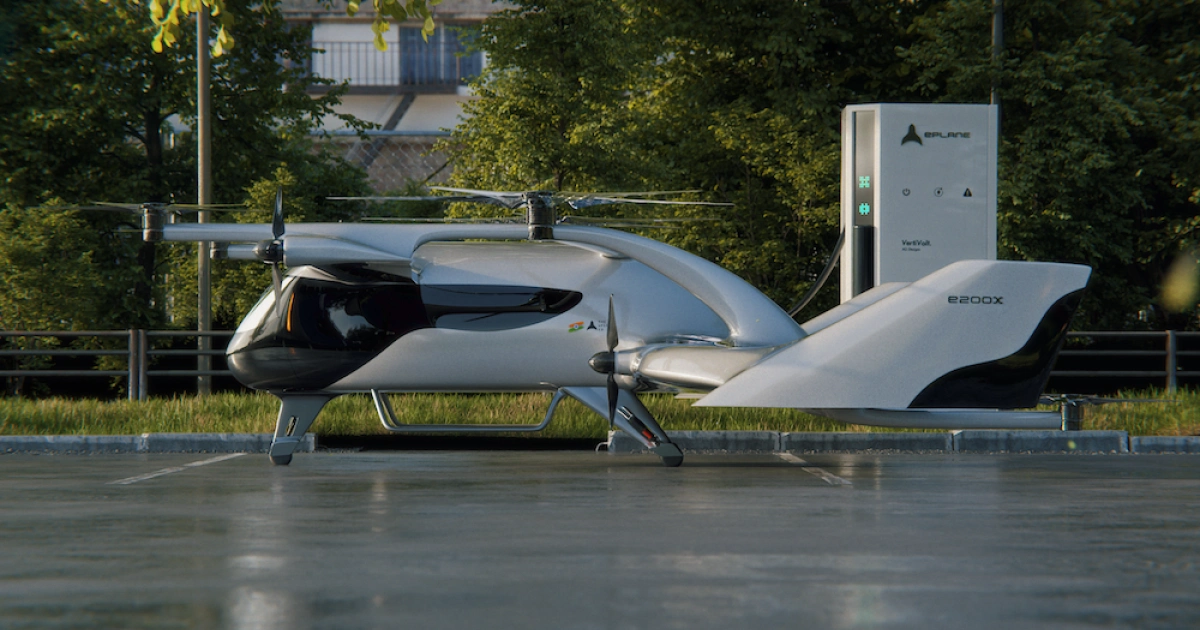|
Getting your Trinity Audio player ready...
|
The e200 aircraft should have a range of up to around 60 nm

March 7, 2025
Indian start-up ePlane has said it will have the first full-scale prototype of its e200X eVTOL aircraft ready to start flight testing around the middle of 2025, with another example to follow by year-end, and a third in 2026. The Chennai-based company has spent the past seven months conducting wind tunnel tests with a quarter-scale model as it works towards a highly ambitious target for type certification by the end of 2026.
To accelerate efforts to get the two-seat model to market, ePlane this year intends to raise between $30 million and $50 million through a Series C funding round. In 2024, a Series B round raised $14 million for the program with backers led by Speciale Invest and Micelo, who had previously supported a $5.85 million pre-Series A round in 2022.
According to ePlane founder Satya Chakravarthy, the all-electric aircraft will have a range of around 60 nm and be offered with three alternative cabin configurations to suit different missions. Last year, India’s civil aviation regulator awarded design organization approval to the company, which it needs to conduct all the steps towards type certification.
Chakravarthy told AIN that the country’s Directorate General of Civil Aviation (DGAC) has been proactive in creating the regulatory framework for certifying eVTOL aircraft. With both the FAA and EASA working towards certification with several eVTOL developers in their jurisdictions, the Civil Aviation Administration of China is the only regulator that has so far issued type and production certificates to local companies EHang and AutoFlight.

According to Chakravarthy, the DGAC has issued guidelines covering safety requirements for the design, construction, and performance of eVTOL aircraft, as well as specifications for vertiports. Now, the agency is working on regulations covering airspace and air traffic management for the new air vehicles.
The Indian government has provided funding for so-called sandboxes to develop advanced air mobility (AAM) services. This has involved identifying three locations in Gujarat state, and two more in Andhra Pradesh, where eVTOL flight testing can be conducted over the next 18 months.
Agreements Signed with Operators
So far, ePlane has signed memoranda of understanding covering possible aircraft sales with two prospective operators in India and said it has also been in talks with a large cargo delivery company. It envisages an initial production rate of between 100 and 200 aircraft, rising progressively to 1,000 units in the third year of production.
ICATT, or the International Critical-Care Air Transfer Team, wants to deploy the e200 for medical emergency transfer flights. Formed in 2010, the Bangalore-based organization has indicated that it may have a long-term requirement for almost 800 aircraft and has agreed to work with ePlane to design a suitable cabin layout to carry medical equipment.
ModAir Aviation has signed a provisional sales agreement for 15 of the e200X model. Its main ambition is to operate air taxi services in the new “Smart Sustainable City” development backed by the state government of Gujarat. The 737-square-mile community in Dholera Gujarat is intended to be occupied by around one million people.
On March 3, Dubai-based business aviation services group Empire Aviation launched a collaboration with ePlane to advance plans for air taxi services in the UAE and Southeast Asia. A manager of aircraft in the charter market, the company will provide ePlane with operational support for fleet management, flight tracking, and maintenance. According to Chakravarthy, operating economics for Southeast Asian markets like Thailand and Indonesia will have very compelling cost structures, similar to those it expects eVTOL operators to benefit from in India.
Also this week, ePlane signed an agreement with Indian AAM group ETAC to secure help in developing vertiports and training eVTOL pilots based on a revenue-sharing model. The company is working on plans for an air taxi network across the National Capital Region surrounding Delhi and has reported discussions with “more than one” eVTOL aircraft manufacturer about possible orders.
Chakravarthy is also the founder of Agnikul Cosmos, which was the first company in India to have launched a rocket using 3D build-to-print technology, and he has a background in carbon fiber composite manufacturing. With another collaboration underway with the Tata group using artificial intelligence and data analytics to forecast battery life, ePlane also has ambitions to develop and build drones alongside its eVTOL aircraft.


